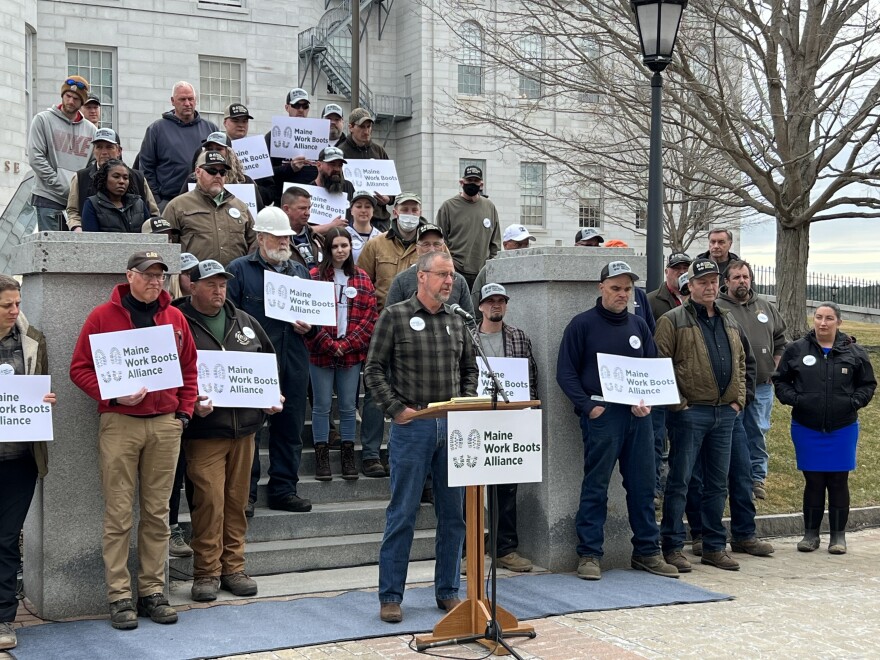A group of wastewater treatment operators, farmers and landfill operators are urging lawmakers to reject a proposed ban on the spreading of sludge on land.
After years of sounding the alarm about contamination with the so-called "forever chemicals" known as PFAS, environmental and health activists as well as some farmers are now pushing to end the long-standing practice in Maine of using treated municipal sludge as fertilizer. And if recent votes on other PFAS-related bills are any indication, they appear to have the momentum. Lawmakers have tightened health standards on the industrial chemicals now linked to cancer, kidney disease and a growing list of the problems. They’ve also set aside tens of millions of dollars to clean up contaminated sites.
But David Hughes with the Scarborough Sanitary District said Thursday that eliminating the option of spreading treated sludge on land will double his costs of disposing of sludge. Hughes supports an alternate version of the bill that would set a PFAS limit for all types of sludge — including septic tank waste — before it can be applied to land.
"In closing what I really want to say is don't let bad practices of the past stop sound, scientifically based, good environmental practices of today,” Hughes said during a press conference held by a group calling itself the Maine Work Boots Alliance.
The groups is lobbying lawmakers to reject the outright ban on land application of treated sludge, which the industry also refers to biosolids. The group includes wastewater treatment facilities, the Maine Farm Bureau and Casella, the waste management company that operates Juniper Ridge Landfill in Old Town as well as the Hawk Ridge composting facility in Unity.
Courtney Hammond, a farmer from Harrington in Washington County, said he hasn't personally used sludge on his farm fields. But he's heard from other farmers concerned about losing access to a low-cost but highly effective material to enhance the nutrients in their soils. Hammond, who serves on the board of directors of the Maine Farm Bureau, warned that farmers are already paying higher costs for everything, and the loss of access to this additional fertilizer could drive more farmers out of business.
“If they export this material to other states even to Canada, and they use it there for the same purposes as we do here in Maine, we are going to be importing that food from those places where the monitoring doesn’t exist is isn’t as strict,” Hammond said. “What we're asking you is just a common-sense based approach to let the science catch up to this problem,” Hammond said.
But advocates for a ban on sludge spreading say the science is increasingly clear that even tiny levels of PFAS can be dangerous. And they contend that the alternate version of the bill supported by Casella and wastewater treatment plants would actually weaken existing standards in Maine.
The Maine Department of Environmental Protection is investigating more than 700 sites around the state that were licensed to spread sludge now considered at higher risk of PFAS contamination, often because some of the sludge came from an industrial source. Several farmers around the state have publicly disclosed PFAS contamination tied to sludge.
One of those is Adam Nordell, who along with his wife, Johanna Davis, has suspended all production on their organic vegetable and grain farm in Unity. Sludge was spread on the land they now farm decades before they bought it, and their well water contains hundreds of times more PFAS than the state says is safe. Nordell said he, his wife and his toddler son all also have industrial levels of PFAS in their blood.
Nordell watched Thursday’s press conference outside of the State House. Afterward, he said he was disheartened to hear people advocate for continued sludge application to land and the sale of compost made with sludge given what he and many other farmers are experiencing.
"I'm distressed by that,” Nordell said. “This is not the time to ask for increased thresholds of PFAS going out on our farm soils. As I’ve said before, our farm is incredibly contaminated based on historic land-spreading. And I just think that clean farmland looks incredibly precious – it looks like an invaluable resource. And to think that we would be land-spreading on clean land at this point is beyond what I can understand.”
The bill, LD 1911, is expected to come up for a vote in the full House and Senate next week.



